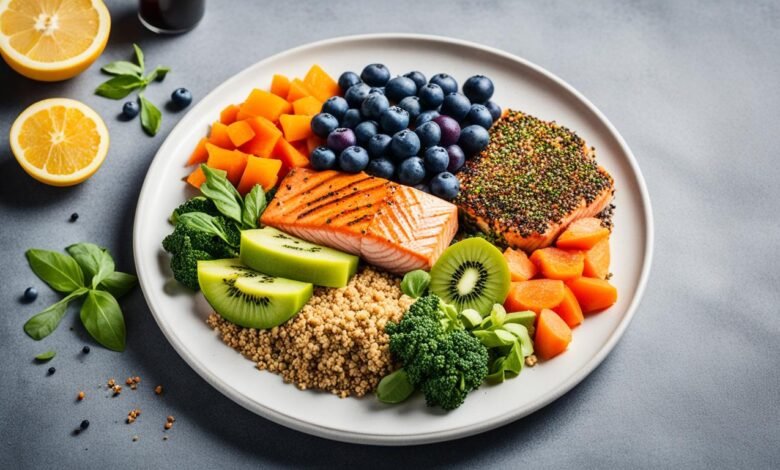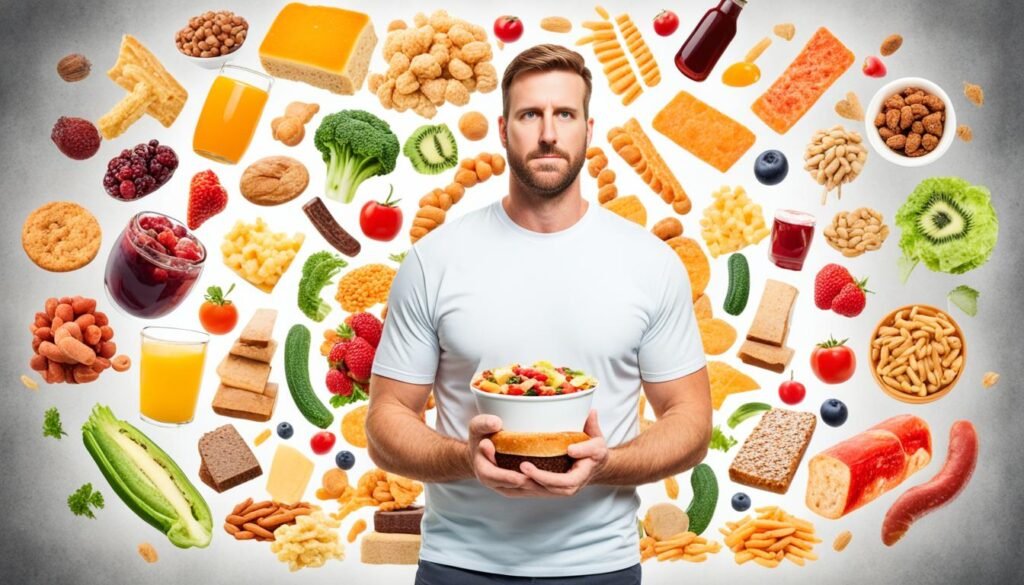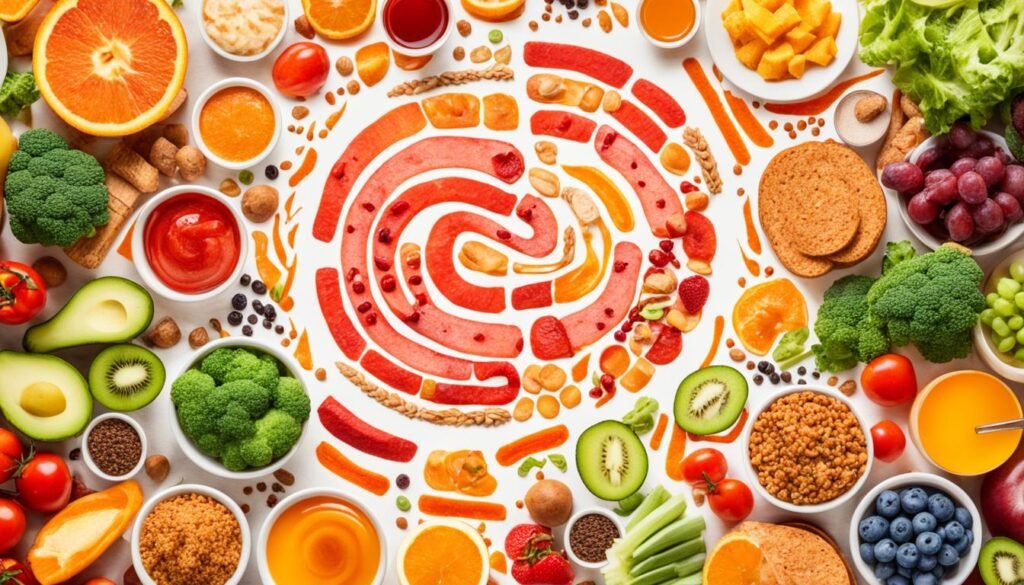
If you have inflammatory bowel disease (IBD), managing your diet is critical to easing symptoms. This is true whether you’re in the midst of a flare-up or in remission. While there’s no universal diet for IBD, certain eating habits can help. In this piece, we will look at diet recommendations aimed at controlling IBD, no matter the phase you’re in.
No matter if you’re facing ulcerative colitis or Crohn’s disease, the foods you choose matter. We will guide you on what to eat during flares and how to progress your diet when in remission. Furthermore, we’ll share useful tips and information to help you take charge of your condition.
Don’t forget, partnering with your healthcare team is crucial. This includes your doctor and a registered dietitian. Such a team can help tailor a diet and nutritional plan just for you. Let’s get started on exploring ways to ease the burden of inflammatory bowel disease with the right diet strategies!
Diet Recommendations for Ulcerative Colitis Flare
During an ulcerative colitis flare, a low residue diet can help. It reduces stomach pain and diarrhea. It’s crucial to give specific diet advice for flare-ups. This management can help heal.
1. Avoid Foods That Increase Stool Output
Avoid foods that up stool output like fresh veggies, fruits, prunes, and coffee. These items make diarrhea and pain worse. This makes the flare-up more bearable.
2. Decrease Consumption of Sweets and Alcohol
Less sweets and alcohol are better during a flare. This means fewer candies, cakes, sugary drinks, and alcohol. Alcohol can make your stomach lining unhappy, worsening symptoms.
3. Incorporate Omega-3 Fatty Acids
Eating more foods rich in omega-3 can lower inflammation. This helps with ulcerative colitis symptoms. Foods like salmon, mackerel, and herring are great. Try to eat them often.
4. Eat Smaller, More Frequent Meals
Eating smaller, more often can ease digestion. It also helps take in more nutrients. This method avoids overwhelming your gut and minimizes discomfort.
5. Consider Nutritional Supplements
Supplements might be needed if you can’t eat or digest solid food well. They give necessary nutrients, boosting your diet. This supports your body during flares.
By sticking to these diet tips, you can reduce symptoms and aid healing. They help you take better care of your health during a flare.
Diet Recommendations for Crohn’s Disease Flare
When a Crohn’s disease flare happens, it’s vital to eat carefully. This can help with pain and diarrhea symptoms. Try a low residue diet to feel better. Here’s what you should do:
- Don’t eat fresh fruits and veggies that make you go more.
- Skip prunes and other foods that make diarrhea worse.
- Say no to drinks with caffeine, they speed up your bowels.
- Eating cold foods might help with diarrhea. Try adding them to your meals.
- Go lactose-free if milk upsets you.
- For those who can’t absorb fats well, eat mostly low-fat foods.
- Having small meals more often might make eating easier, lessening any pain.
- Take supplements if you’re not that hungry. They help keep you well.
By following these tips, you can better cope with Crohn’s disease flares. Always talk to a doctor or dietitian for advice that fits you personally.
Diet Progression Following Flares for Ulcerative Colitis and Crohn’s Disease
After a flare-up of ulcerative colitis or Crohn’s, it’s key to follow a specific diet progression. This plan helps you gradually add foods back in and restore gut health. You’ll start with easy-to-digest liquids, then move to soft solids. Eventually, you can eat a variety of nutritious foods.
Start with broths, clear soups, and low-fiber juices. These liquids offer hydration and nutrients. They’re also gentle on your gut.
Next, add soft solid foods that are easy to digest. Eat things like cooked veggies, mashed potatoes, and smooth nut butters. Avoid any foods that might make your symptoms worse.
Table: Sample Diet Progression for Ulcerative Colitis and Crohn’s Disease
| Stage | Food Examples |
|---|---|
| Stage 1 | Liquids: Broths, clear soups, low-fiber juices |
| Stage 2 | Soft Solids: Cooked vegetables, mashed potatoes, smooth nut butters, well-cooked grains |
As you move through the stages, add more solid foods. Focus on a variety of fruits, veggies, whole grains, proteins, and low-fat dairy. These foods are full of nutrients and support your digestive health.
Slowly add fiber back as you can. Fiber is crucial for good gut health and preventing constipation. But, everyone’s fiber tolerance is different. Listen to your body and adjust as needed.
After a flare, watch your calorie and protein intake. Enough calories and protein help your body heal and stay strong. They support recovery and keep you healthy.
Image: Ulcerative colitis and Crohn’s disease diet progression
Working with your healthcare team and following this diet can help manage ulcerative colitis and Crohn’s. Always talk to your doctor or dietitian for advice tailored to you. They can help you with a plan that fits your needs and health.
Treatments and Nutritional Side Effects
Some drugs used for moderate to severe IBD flares can have side effects on nutrition. It’s key to know what these are and talk to your healthcare team. We’ll look at common treatments and their effects on nutrition.
Corticosteroids (prednisone)
Corticosteroids, like prednisone, help control inflammation during an IBD flare. They can make it harder for your body to absorb minerals and vitamins. This might cause deficiencies if not watched carefully.
Cholestyramine
Doctors sometimes use cholestyramine to treat diarrhea in IBD. But, it can make it harder for your body to absorb certain vitamins. This can lead to not getting enough of these nutrients.
5-ASA Compounds
Medicines containing 5-ASA, like mesalamine, are usual for IBD because they help reduce inflammation. They tend to have fewer side effects than corticosteroids. But they can still cause stomach problems like nausea and diarrhea. These issues might affect how well you get nutrition from your food.
Sulfasalazine
Sulfasalazine, used to treat IBD, may reduce the body’s intake of folate, crucial for making red blood cells. Not getting enough can lead to a folate deficiency.
Surgery for IBD, like a bowel resection, can also alter nutrition. It might reduce the absorption of nutrients. Working with your doctor or dietitian is important to prevent deficiencies.
Always talk to your healthcare team about any concerns with the medicines you’re taking. This will help make sure you’re getting the nutrition you need while managing your IBD.

Nutritional Needs for People with IBD
It’s key to manage your nutritional needs when you have IBD. Your needs vary based on the disease stage, your size, and age. Focusing on getting key nutrients helps you stay healthy and ease symptoms.
Calorie Needs and Inflammation
When you’re inflamed, your body might need more calories to fight back. But with IBD, you might lose weight because you’re not hungry or your body can’t take in nutrients well. Eating foods high in nutrients can give you the calories you need.
Protein Needs and Corticosteroids
Protein is crucial for healing tissues and boosting your immune system. If you’re inflamed or taking corticosteroids, you might need more protein. Your doctor can help you figure out how much protein you should eat based on your weight and health.
Fluid and Electrolyte Needs
Diarrhea from IBD can cause fluid and electrolyte problems. It’s crucial to drink lots of fluids and replace lost electrolytes. Water, sports drinks, or rehydration solutions can help. Your healthcare team can give you personalized advice on how to stay hydrated.
Vitamins and Minerals
Getting enough vitamins and minerals is very important for those with IBD. Because you might not absorb nutrients well, or eat less, you could face deficiencies. A varied, balanced diet is your best friend, but sometimes, you need supplements. Ask your healthcare team if you need any extra vitamins or minerals.
Summary
It’s vital to understand and meet your nutritional needs with IBD. Eating nutrient-rich foods is a must for enough calories and protein. Stay hydrated, and consider supplements for any nutrient gaps. Prioritizing your diet helps you combat IBD and supports your well-being.
Diet Recommendations During Flare-Ups
When you’re facing inflammatory bowel disease flare-ups, your diet can make a big difference. It can help reduce symptoms and speed up healing. Let’s go through some helpful tips for eating right during flare-ups:
Decrease Fiber Intake
Lowering your fiber intake can lessen stomach pain and diarrhea. Focus on eating foods that are gentle on your stomach. This also means they are less likely to upset your gut.
Some examples of low-fiber foods are:
- Go for white bread, white rice, and refined cereals
- Opt for cooked vegetables over raw or high-fiber options
- Choose canned or soft fruits instead of fresh or dried ones
Adequate Protein Intake
Protein is crucial for healing during flare-ups. Make sure to add lean proteins to your meals and snacks. This helps your body repair itself.
Here are some great sources of protein:
- Pick poultry like chicken or turkey
- Try fish such as salmon, tuna, or cod
- Choose lean cuts of beef or pork
- Include deli meats, like turkey or ham
- Eggs are also a good option
- Don’t forget nut and seed butters
Plenty of Fluids
Keeping hydrated is key during flare-ups. Diarrhea can cause you to lose a lot of fluid. So, make sure you drink plenty of water and other liquids all day.
Limit Added Fats and Oils
It’s wise to limit fats and oils when you’re having flare-ups. They might make your symptoms worse. Carefully choose your cooking methods. Use minimal oil or try baking or steaming your food.
Adequate Intake of Calcium, Vitamin D, Probiotics, and Prebiotics
Getting enough of certain nutrients is vital for your gut health during flare-ups. Include foods that are rich in calcium and vitamin D. This includes both dairy and non-dairy options that are fortified. Don’t forget about probiotics and prebiotics for a healthy gut.
If needed, talk to your healthcare team about supplements.

Examples of Low-Fiber Foods to Consume During Flare-Ups
| Food Category | Low-Fiber Options |
|---|---|
| Grains and Starches | White bread, white rice, refined cereals |
| Vegetables | Cooked vegetables (steamed, boiled, or roasted) instead of raw or high-fiber ones |
| Fruits | Canned or soft fruits instead of fresh or dried fruits |
These tips can really help you manage your symptoms and heal your gut. Always talk to your doctor or dietitian for advice personalized to you.
Diet Recommendations During Remission
When dealing with inflammatory bowel disease (IBD) remission, a healthy diet is key. It helps your gut stay healthy and makes you feel better overall. Here are some tips to remember:
- Increasing fiber intake: Add whole grains, fruits, and veggies back to your meals slowly. This will up your fiber, making digestion smoother and healthier.
- Consuming omega-3 fatty acids: Eat fatty fish like salmon and take omega-3 supplements. These foods can fight inflammation, helping your gut.
- Focusing on wholesome foods: Go for foods that aren’t processed much and have few ingredients. Pick lean proteins, whole grains, and plenty of fruits and veggies for all the important nutrients.
- Including dairy and lactose products: In remission, some might find dairy is ok. If it works for you, enjoy these foods in moderation for their nutrients.
- Moderate intake of added fats: Use fats like oils and spreads wisely to make your meals tastier. Pick healthy fat sources like olive oil and avocado, and watch your portions.
- Maintaining adequate protein intake: Protein is crucial for healing your body and staying healthy. Keep eating proteins like poultry, fish, eggs, or plant-based ones.
- Staying hydrated: Drink lots of water daily to keep your body working well. Aim for 8 cups (64 ounces) each day to stay hydrated.
Following these tips in remission boosts gut health and keeps your diet in balance. This supports your overall health.
Sample Meal Plan During Remission
Curious about how to plan your meals with these tips? Here’s a meal plan idea:
| Meal | Food Choices |
|---|---|
| Breakfast | Spinach and mushroom omelet with whole wheat toast |
| Snack | Fresh apple slices with almond butter |
| Lunch | Grilled chicken breast with quinoa and steamed vegetables |
| Snack | Yogurt with mixed berries |
| Dinner | Baked salmon with sweet potatoes and sautéed spinach |
| Snack | Handful of mixed nuts |
Remember, adjust your meals based on how you feel and what foods your body likes. A dietitian specialized in IBD can give more tailored advice on eating well during remission.
Tips for Managing Inflammatory Bowel Disease
Alongside a recommended diet, there are many ways to ease inflammatory bowel disease (IBD). These tips can boost your well-being and cut down on symptoms. Changing your lifestyle plays a big part in handling IBD smoothly:
1. Keep a Food Diary
Start a food diary to spot foods that may worsen your IBD symptoms. Note what you eat, drink, and the symptoms afterward. This info helps you steer clear of or cut back on certain foods.
2. Consider a Low FODMAP Diet
Some people with IBD might benefit from a low FODMAP diet. It’s best to talk to a dietitian to see if this diet is right for you.
3. Stay Hydrated
Drinking enough water is crucial for those with IBD. It helps your gut function well and keeps you from getting dehydrated. Steer clear of caffeine and energy drinks, though, as they can make your symptoms worse.
4. Use Caution with Supplements
If you’re thinking about taking supplements, check with your healthcare team first. They’ll let you know which ones to take, if any, to avoid drug interactions.
5. Quit Smoking
Smoking makes IBD symptoms more severe in some people. Stopping smoking can help better manage your IBD and ease symptoms.
6. Engage in Regular Physical Activity
Exercising regularly is good for stress, digestion, and your overall health. Try to get in at least 150 minutes of moderate exercise per week, or follow your healthcare provider’s advice.
7. Maintain a Healthy Lifestyle
Get enough sleep, manage stress, and eat a balanced diet. These habits really can lessen how often and how bad your IBD symptoms are.
By following these tips, you can take control of your IBD and better your life. Always work with your healthcare team to tailor a management plan just for you.
Conclusion
Dealing with inflammatory bowel disease (IBD) varies from person to person. But, sticking to certain diets can ease symptoms and improve gut health. It’s vital to team up with your doctor and a dietitian. They will help create a diet that’s just right for you.
By making smart food choices, you can boost your life quality and handle IBD better. Keep a food diary to track what you eat and how it affects you. Also, know what foods might trigger your symptoms. Trying out diets like the low FODMAP diet might help too.
Don’t forget to drink lots of water and skip on drinks with caffeine. It’s also key to include exercise in your routine and steer clear of smoking. All these, along with your healthcare team’s support, will help you manage IBD well.
With the right diet and support from your healthcare team, you can take charge of IBD. Remember, you’re not by yourself in this fight. Your healthcare team is ready to stand by you, helping every step of the way.
Source Links
- https://www.ucsfhealth.org/education/nutrition-tips-for-inflammatory-bowel-disease
- https://www.uhhospitals.org/blog/articles/2020/07/the-best-foods-to-eat-avoid-for-inflammatory-bowel-disease
- https://www.mayoclinichealthsystem.org/hometown-health/speaking-of-health/lifestyle-and-diet-in-inflammatory-bowel-disease




